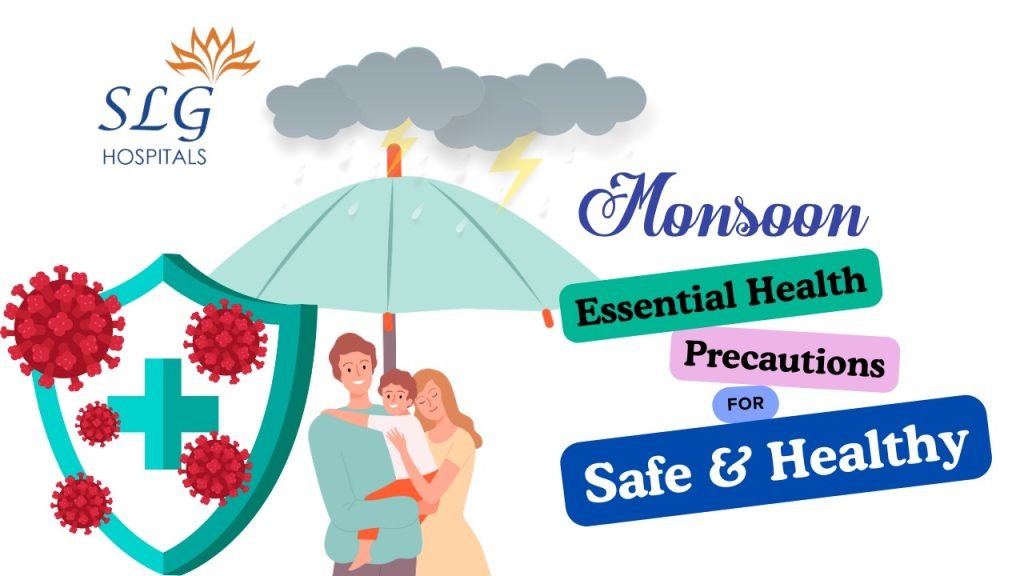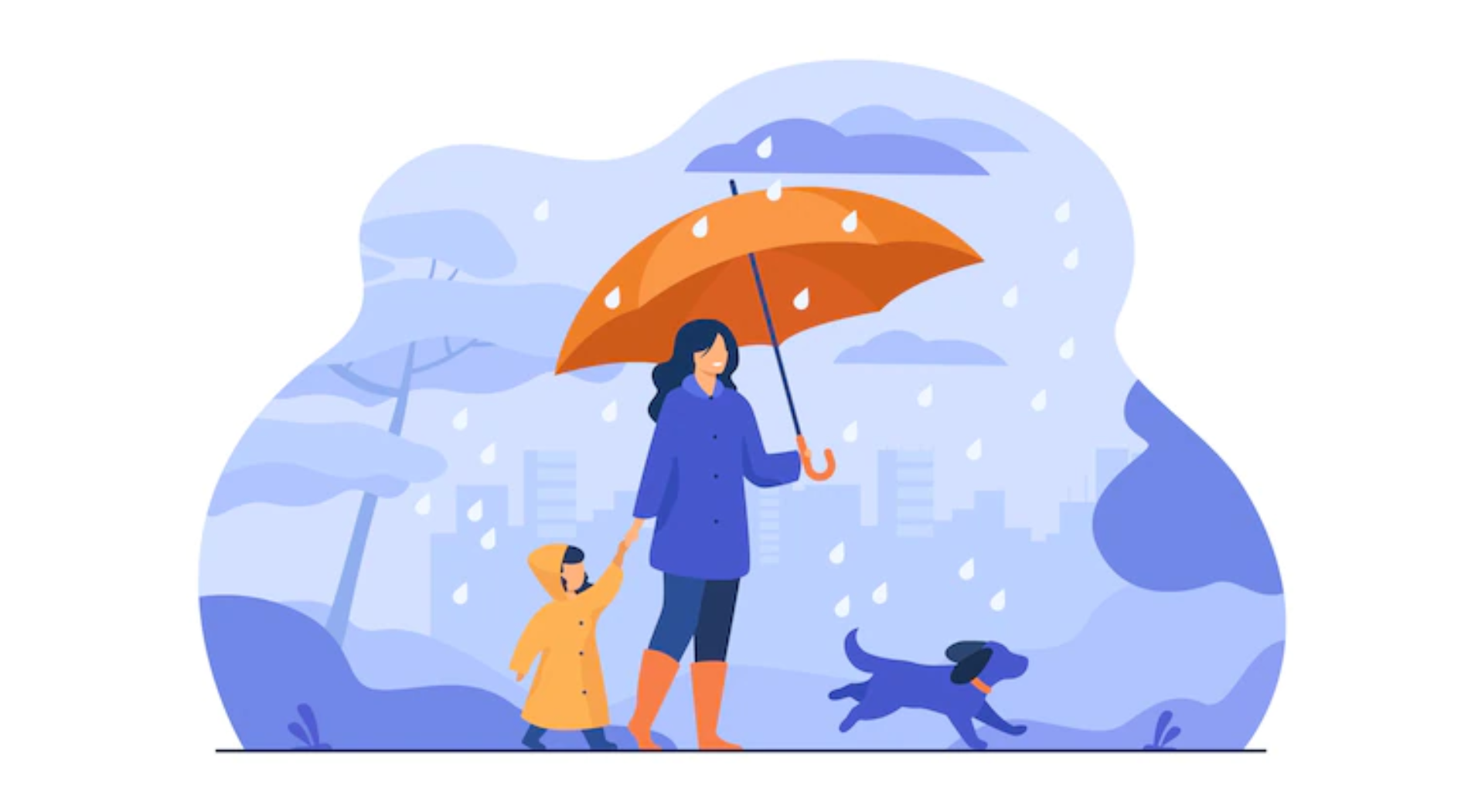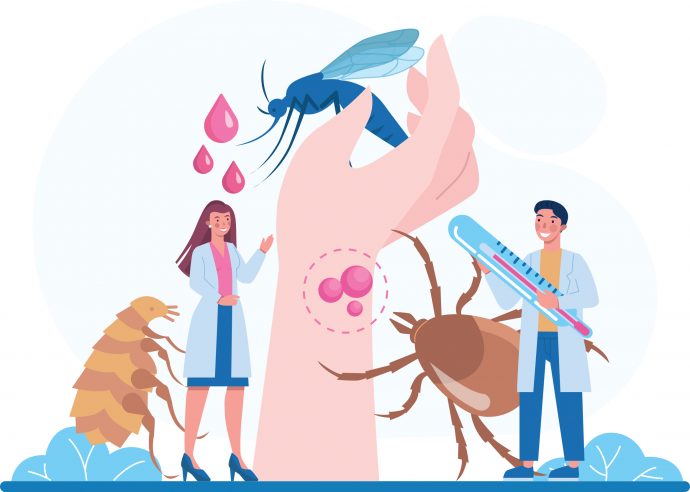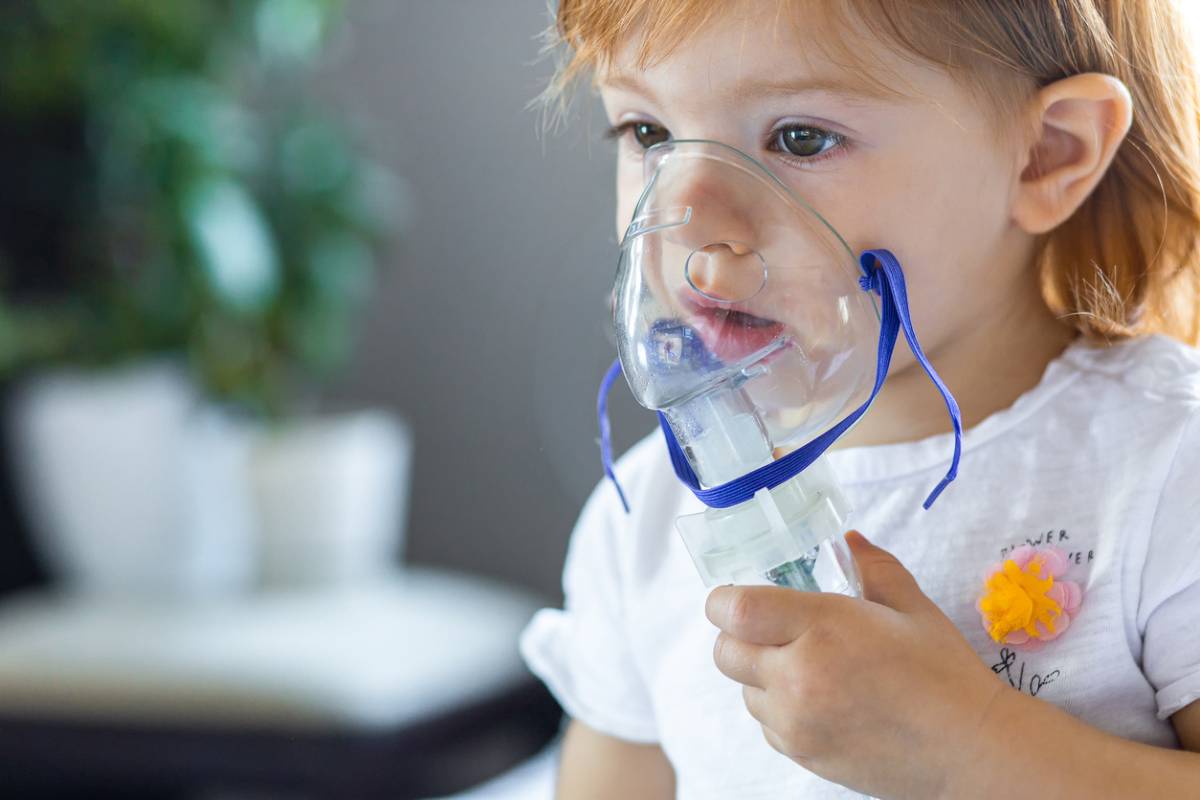MONSOON WELLNESS: ESSENTIAL HEALTH PRECAUTION FOR A SAFE AND HEALTHY RAINY SEASON

The rainy season brings much-needed relief from the heat, but it also brings a host of health challenges. Increased humidity, stagnant water, and fluctuating temperatures can create an environment ripe for the spread of various diseases. To stay healthy during this time, it is crucial to take specific precautions.
This blog by a senior General Physician at SLG hospitals, Bachupally explores immediate health precautions to ensure you and your family remain safe and healthy throughout the rainy season.
Immediate Health Precautions to Take During the Rainy Season

1. Avoiding Waterborne Diseases
Waterborne diseases such as cholera, typhoid, and hepatitis A are common during the rainy season. These diseases are primarily spread through contaminated water.
Drink Safe Water
- Boil Water: Boiling water kills most pathogens. Ensure you boil water for at least one minute before drinking.
- Use Water Purifiers: Water purifiers with UV and RO technologies can effectively remove contaminants.
- Bottled Water: When outside, opt for reputable bottled water brands to avoid the risk of contamination.

Personal Hygiene
- Handwashing: Regular handwashing with soap and water, especially before eating and after using the toilet, can prevent the spread of diseases.
- Sanitizers: Carry an alcohol-based hand sanitizer when you’re outdoors.
2. Preventing Vector-Borne Diseases
The rainy season is also a prime time for vector-borne diseases like dengue, malaria, and chikungunya, transmitted by mosquitoes breeding in stagnant water.

Mosquito Control Measures
- Eliminate Stagnant Water: Ensure there is no standing water in and around your home. This includes checking flower pots, coolers, and any containers that can collect water.
- Use Mosquito Repellents: Apply mosquito repellents on exposed skin and clothing. Natural repellents like citronella and neem oil can also be effective.
- Protective Clothing: Wear long-sleeved shirts, long pants, socks, and shoes to minimize exposed skin, especially during dawn and dusk when mosquitoes are most active.
- Mosquito Nets: Use mosquito nets over beds, particularly for infants and elderly individuals.
- Home Protection and Install Screens: Fit windows and doors with screens to prevent mosquitoes from entering.
- Insecticides: Use insecticides and mosquito coils in areas where mosquitoes are prevalent.
3. Managing Respiratory Issues
As per a specialist Pulmonologist at SLG Hospitals, The increased humidity during the rainy season can exacerbate respiratory problems and allergies.

Indoor Air Quality
- Ventilation: Ensure proper ventilation in your home to reduce dampness and mold growth.
- Dehumidifiers: Use dehumidifiers to maintain optimal humidity levels indoors.
- Air Purifiers: Air purifiers with HEPA filters can help remove allergens and pollutants from the air.
- Personal Care
- Avoid Damp Areas: Mold and mildew thrive in damp conditions and can trigger respiratory issues. Avoid spending too much time in damp areas.
- Warm Clothing: Wear warm clothing to protect yourself from sudden temperature drops, which can lead to respiratory infections.
4. Food Safety
Foodborne illnesses are also common during the rainy season due to increased microbial activity.

Food Preparation
- Cook Thoroughly: Ensure all food is cooked thoroughly, especially meat and seafood.
- Wash Vegetables and Fruits: Wash vegetables and fruits with clean, filtered water to remove any contaminants.
- Avoid Street Food: Street food can be tempting but often carries a higher risk of contamination during the rainy season.
- Store and Refrigerate Promptly: Store perishable items in the refrigerator to prevent bacterial growth.
- Seal Containers: Use airtight containers to store food items and keep pests away.
5.Skin Care
The combination of humidity and rain can lead to various skin problems such as fungal infections and allergies.

Hygiene Practices
- Stay Dry: Keep your skin dry and avoid wearing damp clothing for extended periods.
- Antifungal Powders: Use antifungal powders on areas prone to sweat and moisture, such as feet and underarms.
- Moisturize: Use light, non-greasy moisturizers to keep your skin hydrated without clogging pores.
- Foot Care, Footwear: Wear waterproof and breathable footwear to prevent fungal infections.
- Foot Hygiene: Wash your feet thoroughly and dry them well, especially between the toes.
6.Hydration and Nutrition
Proper hydration and nutrition are vital for maintaining health during the rainy season.

Hydration
- Hydrate Regularly: Drink plenty of clean water to stay hydrated. Herbal teas and soups can also be beneficial.
- Electrolytes: Consider oral rehydration solutions or electrolyte drinks if you feel dehydrated.
- Nutrition and Balanced Diet: Maintain a balanced diet rich in vitamins and minerals to boost your immune system.
- Avoid Junk Food: Reduce intake of junk food and opt for home-cooked meals.
7.Exercise and Mental Health
Physical and mental well-being are equally important during the rainy season.

Exercise
- Indoor Workouts: Engage in indoor exercises such as yoga, aerobics, or home workouts to stay active.
- Stretching: Regular stretching can help maintain flexibility and prevent stiffness.
Mental Health
- Stay Connected: Maintain social connections through calls or video chats to combat the feeling of isolation due to rain.
- Mindfulness: Practice mindfulness or meditation to manage stress and anxiety.
8. Emergency Preparedness
Be prepared for potential emergencies that can occur during heavy rains, such as flooding or power outages.

Emergency Kit
- First Aid Kit: Keep a well-stocked first aid kit with essentials like bandages, antiseptics, and medications.
- Flashlights and Batteries: Ensure you have flashlights and extra batteries in case of power outages.
- Important Contacts: Keep a list of emergency contact numbers handy.
Safety Measures
- Evacuation Plan: Have a clear evacuation plan in place if you live in a flood-prone area.
- Secure Belongings: Secure important documents and valuables in waterproof containers.
The rainy season can be a challenging time for maintaining health, but with the right precautions, you can protect yourself and your loved ones from common health issues.
From ensuring safe drinking water and maintaining personal hygiene to preventing mosquito bites and managing respiratory issues, each step plays a crucial role in staying healthy
Remember to also focus on proper nutrition, hydration, and mental well-being to fully enjoy the refreshing and revitalizing aspects of the rainy season. Stay safe, stay healthy, and make the most of this beautiful time of year.















